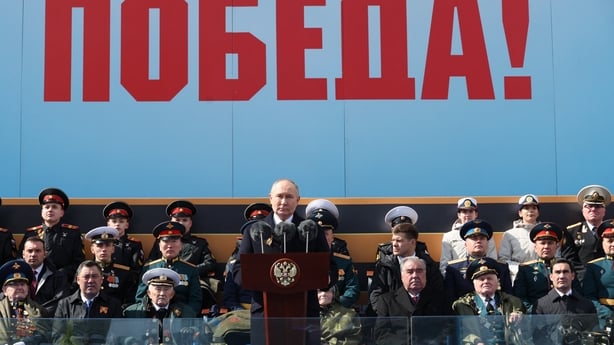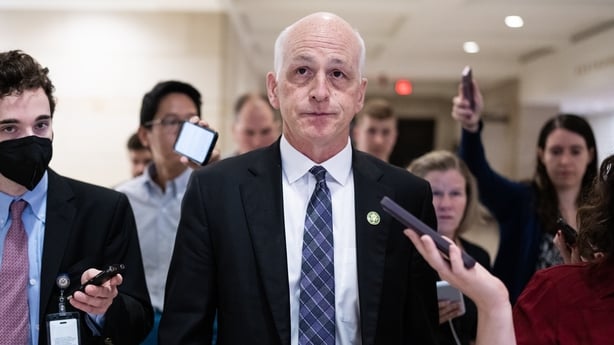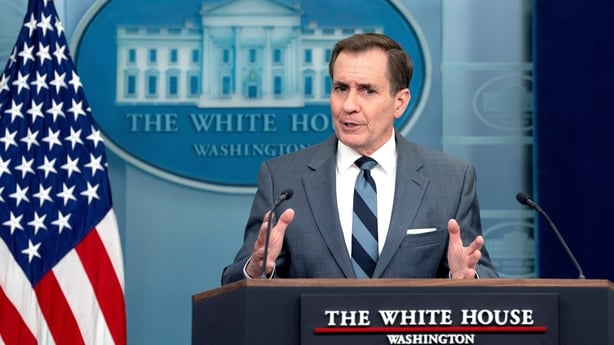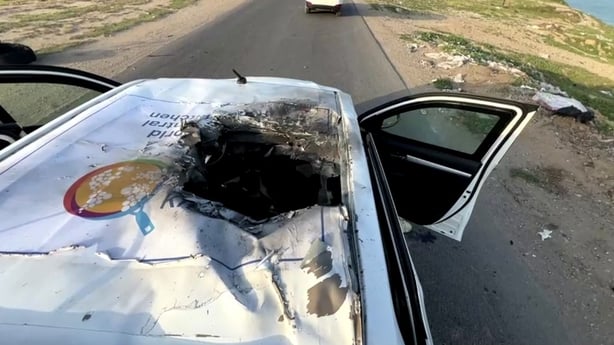Will US President Joe Biden be the biggest political loser of the Gaza war? And has this week, of rapid fire and movement on this issue - and others - been the tipping point in an election of fine margins?
If that is so, the binary logic of US Presidential elections implies Donald Trump will be the war's biggest political winner.
Mr Biden’s week was the culmination of months of issues that became tensions that finally snapped.
The suspension of a weapons shipment to Israel marking a significant inflection point in relations with a key ally and exposing the president to yet more criticism from Republican politicians, of course, but also from some Democrat politicians concerned that it sends the wrong message at the wrong time.
Israel’s Prime Minister Benjamin Netanyahu responding with a declaration that military operations against Rafah will go ahead, regardless of what the US says or does, and that Israel will go it alone and "fight with our fingernails" if necessary.
On and off again ceasefire talks in Cairo, led for the president by his CIA director Bill Burns, which Hamas appears to have been playing for tactical advantage.
The US finding itself in a group of nine countries that voted against admitting Palestine as a full member state of the United Nations, while 143 voted in favour and 25 abstained.
Mr Biden’s national security spokesman explained the US position on Friday afternoon: "We continue to believe in the power promise of a two-state solution and an independent state for the Palestinian people.
"That's something that President is fully and firmly committed to. We also believe that the best way to do that is through direct negotiations with the parties and not through a vote, at the UN, of this of this kind. So that's why we voted no."
And on Friday night – after normal working hours, so the press is not happy either – a long-awaited report on whether Israel breached US and international laws in its conduct of the war in Gaza.

In short, it concluded that Israel might have breached its obligations – particularly by attacking aid workers and not letting enough humanitarian aid into Gaza - but not enough to justify a halt to US military aid to Israel.
The limits of US power - and the prestige that rests on it - exposed, tested, picked over by small players in the Middle East while Russian President Vladimir Putin rallied his troops in Red Square and promised them another victory in Europe and China’s President Xi Jinping visited Paris, Budapest and Belgrade, a reminder that other hegemons are available.
Mr Biden’s half century as a practitioner of US foreign policy may have gone through its most critical test this week.
We are going to have to wait for the results to come back.
But right now, it looks like he is not satisfying the student protestors and more importantly the younger voters they are a proxy for, nor the pro-Israel factions of the Republican and Democrat parties, nor Israel itself, nor elements in his own administration, nor the Palestinians, nor those who look to US leadership in the wider world.
The big inflection point was halting a shipment of aircraft bombs to Israel on Wednesday to try and change the course of the Israeli government over its intention to go on the offensive against Hamas in Rafah, in southern Gaza.
Some Republican politicians reacted with fury, denouncing the move as leaving a key ally to swing in the wind, selling out the word of the US to, as they would see it, appease the far left of the Democrat Party.
But there were others of the "never Trump" wing of the Republican party, who have often given Mr Biden a pass on policy decision, that rounded on the president over this one.
Notably former Republican Representative Liz Cheney, the scourge of Mr Trump on the 6 January Committee, wrote "withholding aid to Israel is wrong and dangerous. America must not abandon Israel".
But there were also attacks from the centre of his own party.

Washington state Representative Adam Smith, the top Democrat on the House Armed Services Committee, was on TV on Friday morning trying to communicate the difficult terrain Mr Biden was attempting to navigate, but unable to hold back his frustration over halting the supply of aircraft bombs or to be more precise, the fact that this was made public.
"I don't think he should have done it publicly. I think the private conversations were very appropriate," he said.
I think the other possibility is in use restrictions. We've done that, for instance, in Ukraine. Here's your weapons, but you can't fire into Russia," he added.
Mr Smith also thinks its counterproductive, taking the pressure off Hamas to agree to a ceasefire deal quickly and encouraging them to believe the US is on the point of abandoning Israel – it isn’t, but it is exasperated by Mr Netanyahu’s government.
"The biggest block to a ceasefire right now is Hamas and that's being largely under reported," he told CNN.
Mr Smith said: "There has been a ceasefire agreement on the table for months, which the president brokered to allow for the return of hostages and temporary ceasefire. Hamas has blocked that and said no, Israel has to completely withdraw, a permanent ceasefire.
"By the way, we're only going to return some of the hostages over an extended period of time. That offer’s been on the table. We have to keep the pressure on Hamas to agree to that ceasefire."
He thinks the significance of suspending the arms shipment on Wednesday has been overblown: "The US still supports Israel. We also want to get to a better humanitarian situation in Gaza. That's the very difficult terrain the president is trying to navigate."

National Security Spokesman Admiral John Kirby was also trying to explain the president's decision on Friday afternoon: "I think there's been some things getting lost in all the rhetoric and vitriol and hyperbole over the last couple of days.
"The president also said, we're going to do everything we can to help Israel defend itself and obviously they're defending themselves primarily against the threat of Hamas. We have never, ever, ever told them that they can't try to finish off the Hamas battalions that are in Rafah.
"We've never told them they can't operate in Rafah. What we've told them is that the way they do it matters, and that we won't support a major ground operation and invasion smashing into Rafah in a ham-fisted, indiscriminate way.
"I think it's perfectly understandable why we wouldn’t support that kind of, or series of, maneuvers against Hamas. But eliminating the threat of Hamas - absolutely. They have every right to do that, and they'll continue to have our support as they do that."
Mr Kirby said that Hamas represents "a truly genocidal threat against the Israeli people".
However, he said that the US believes there are "better ways" to defeat the militant group such as "more discreet, more targeted, more careful" methods.
"We are eagerly awaiting every opportunity we have to communicate those alternatives to the Israelis," he said.
But are the Israeli’s willing to listen? The State Department report which was released late Friday night, suggests a very fractious relationship between the US and its closest Middle Eastern ally.
Although written in the neutral prose of a government survey, it's clear that the rift between Mr Biden and Mr Netanyahu over the conduct of the war and wider policy in the West Bank as well is now very deep and very wide.
This is particularly the case in the sections covering the supply of humanitarian aid to Gaza’s civilian population.
The report said that "during the period since 7 October, and particularly in the initial months, Israel did not fully cooperate with USG efforts and USG-supported international efforts to maximize humanitarian assistance flow to and distribution within Gaza."
It said that there were "numerous instances during the period of Israeli actions that delayed or had a negative effect on the delivery of aid to Gaza".
The department outlined these actions with specific examples including some senior Israeli government officials were "actively involved in encouraging protests against and attacks on aid convoys that delayed their entry into Gaza".
"Israeli civilian protestors periodically blocked entry points into Gaza during a multi-week period in January and February, resulting in reduced aid flows," it said.
The report said there had been "strikes on coordinated humanitarian movements and deconflicted humanitarian sites that created an exceptionally difficult environment for distributing and delivering aid," it said.
"There have been denials or delays of specific movements of humanitarian actors and extensive bureaucratic delays with regard to implementation of political commitments made by Israeli leaders have further slowed the delivery of assistance to civilians in Gaza," it added.
Even getting visas for humanitarian aid workers to go to Gaza has been problematic.

It seems from the report that it was only after the airstrikes against the World Central Kitchen convoy on 1 April, which provoked public outrage from Mr Biden, that action was taken by Israel to speed up visa issuance and get rid of a months long backlog.
Whilst the State Department report said Israel has been investigating alleged human rights violations during it Gaza incursion, it hasn’t been rushing to provide the Americans with information on everything.
It said: "Limited information has been shared to date in response to US government inquiries regarding incidents under review to determine whether US munitions were used in incidents involving civilian harm.
"However, certain Israeli-operated systems are entirely US-origin (crewed attack aircraft) and are likely to have been involved in incidents that raise concerns about Israel’s IHL (International Humanitarian Law) compliance."
The report said it found no evidence that Israel has deliberately targeted civilians with US supplied weapons.
"The IC has no direct indication of Israel intentionally targeting civilians. The IC assesses that Israel could do more to avoid civilian harm, however," it said.
"The USG reviewed numerous reports of civilian harm resulting from IDF operations during the reporting period, which raised serious questions with respect to whether Israel was upholding established best practices for mitigating civilian harm," it added.
And the report went into some detail about how Israel tries – not very successfully in the US view – to move civilians away from areas which it is going to conduct military strikes in.

"Israel has provided hundreds of tactical pauses to allow civilians to leave combat zones. These range from an evacuation order at the beginning of the war for civilians in northern Gaza to move to the south two weeks before ground operations began; to establishing daily four-hour humanitarian pauses, with three hours notice and evacuation corridors to allow for north-south movements; to hundreds of smaller-scale pauses in specific neighbourhoods to allow civilians to procure supplies and/or seek medical care," it said.
The report found the Israeli Defence Forces (IDF) used various methods to inform Gazans of such pauses including "dropping leaflets, making automated phone calls, and sending SMS text messages".
"Israel has a sophisticated system for identifying where civilians are located in order to try to minimize civilian harm. However, UN and humanitarian organisations have reported Israeli civilian harm mitigation efforts as inconsistent, ineffective, and inadequate, failing to provide protection to vulnerable civilians who cannot or chose not to relocate, including persons with disabilities, persons receiving medical treatment, children, and the infirm," it said.
The State Department said that humanitarian organisations reported that phone/SMS messages were "ineffective during IDF-generated telecommunications blackouts, and civilians received insufficient notice, inaccurate or vague information on where people should go, and on safe evacuation routes".
"Many of the IDF-designated areas to which civilians were directed to seek safety lacked adequate shelter, water, sanitation, food, medical care, security or other support," it said.
The report also found that the rate of civilian harm in the conflict also "raises serious questions about the efficacy of Israeli precautionary measures, notwithstanding Hamas’ deliberate embedding within and use of civilian and humanitarian infrastructure as shelter".
It said that although Israel has knowledge, experience and tools to implement best practices for "mitigating civilian harm" in its military operations, the results on the ground including high levels of civilian casualties, "raise substantial questions as to whether the IDF is using them effectively in all cases".
"This includes the WCK (World Central Kitchen) strike, in which Israel has acknowledged that IDF operators did not follow applicable rules of engagement, and which led the Israelis to take steps to discipline IDF personnel," it said.
This last passage chimes with what Mr Kirby and Mr Smith have been trying to communicate on behalf of the Biden Administration - that the US does not think Israel is doing a good job of separating civilians from combatants in Gaza.
And yet national interests remain aligned, on both sides.
"The covered defence articles (US weapons systems) we have provided during this period have helped Israel maintain deterrence against Iran, Hezbollah, and other Iranian-backed proxies in the region, advancing our objective of preventing the conflict from spreading," it said.
But overall, the report was received negatively, from humanitarian groups and Republican politicians like the ranking member of the Senate Foreign Relations Committee Jim Risch of Idaho.

In a statement, he said: "In keeping with nearly four years of failed foreign policy, the Biden Administration is trying to have it both ways.
"Today, the administration has given Israel a politically damaging assessment while publicly announcing it is withholding a select set of precision weapons. The administration is attempting to placate voters on the far left at the expense of a close ally in the midst of its justified war with Hamas terrorists."
He added that "NSM-20 (the formal name of the reporting and assessment requirement for countries that get US military aid mandated by the President in February) is aimed squarely at Israel in the near-term, but the additional highly-politicised reporting requirements will eventually be aimed at other American allies and partners across the globe, further impeding the delivery of security assistance and undermining our ability to deter China and Russia."
The US’s entanglement in the Gaza war hardwires the nation into an emotionally charged, morally corrosive, humanitarian catastrophe enmeshed in a highly complex geopolitical Rubick's Cube, that never seems to line up right no matter how many times you twist it.
It’s Joe Biden’s fate to have to explain this to the American people in an election year.
But like they say around here, when you’re explaining, you’re losing.






